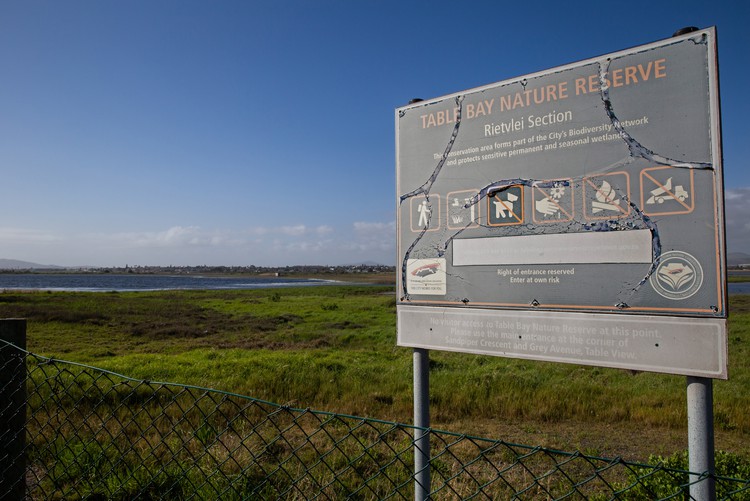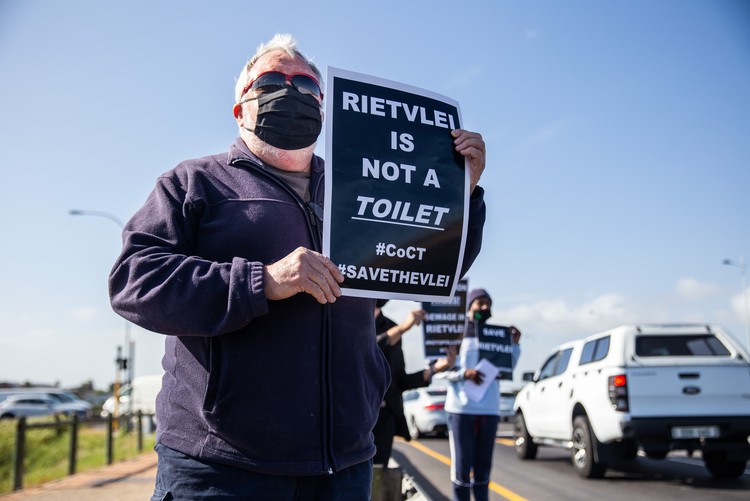Rietvlei pollution unlikely to improve soon, fears Milnerton Aquatic Club
“We’re not seeing any action” by City of Cape Town says club commodore
City of Cape Town test results show Rietvlei’s water poses an “unacceptable risk” to public health. Rietvlei has been closed for recreational use since June. Photo: Ashraf Hendricks
- Water tests in Rietvlei, which has been closed to the public for months, have shown extremely high levels of E. coli.
- Members of the Milnerton Aquatic Club complain that they see no action being taken by the City of Cape Town to fix the problem.
- The club’s commodore says they have found at least three sources of sewage flowing into the vlei.
- The City’s failing sewage system arises from a failure to keep pace with population growth, while vandalism and ageing infrastructure add further strain.
Members of the Milnerton Aquatic Club, based at Rietvlei, are worried that the City of Cape Town has not started to rehabilitate the water. This comes after the club conducted its own water quality tests and found that the level of E. coli in the water was much too high for safe direct recreational contact. Rietvlei has been closed since late June.
Katja Haslinger, the conservation officer at the club, said that when they started doing their own water quality tests, the results were “shocking”.
Results are measured in colony-forming units (cfu) of E. coli (a bacteria found in human faeces) per 100ml. The City considers measurements of more than 4,001 cfu/100ml to pose an “unacceptable risk” to public health.
On 7 September, Haslinger said they measured up to 9 million cfu/100ml coming from the bulk stormwater outlet from Blaauwberg Road. About a week later on 15 September, they measured 2.7 million cfu/100ml coming from another stormwater outlet.
Haslinger said that they are worried sewage spills upstream at Rietvlei are still ongoing.
Earlier this month, GroundUp published the water quality tests provided by the City of Cape Town for three vleis that have been closed for months due to E. coli pollution. Test results taken in Rietvlei on 24 August were all above 23,000 cfu/100ml, with the highest sampling point measuring at 53,000 cfu/100ml (at a buoy near the Bayside canal outlet).
But that data is now one month old, said Haslinger, and it is unclear whether things are better or worse. “Due to the fact that the sewage spills further upstream are still ongoing, we doubt that the Rietvlei waterbody will improve soon,” she said.
Brian Webb, the club’s Commodore, said that they have found at least three sources of sewage flowing into the vlei.
“We’re not seeing any action,” he said.
Webb said the club has also struggled to get a response from the City on developments for sorting out the pollution in Rietvlei.
The Green Scorpions confirmed to GroundUp that it is currently looking into several matters of pollution of the environment as a result of sewage spills in Rietvlei, as well as Zandvlei and Zeekoevlei.
Green Scorpions environmental management inspectors have also served the City a series of enforcement notices, according to Rudolf van Jaarsveldt, spokesperson for Western Cape Department of Environmental Affairs.
He said the City is implementing rehabilitation measures to address the pollution.
Van Jaarsveldt said the City’s sewage system is under strain from vandalism and ageing infrastructure, and the growth of both formal and informal settlements.
“The City has doubled in population over the past 20 years,” he said.
The City failed to respond to our questions sent on Monday.
Brian Webb, Commodore at the Milnerton Aquatic Club, said they will be demonstrating every month to raise awareness to the pollution in Rietvlei. Photo: Ashraf Hendricks
Next: Homeless people’s tents confiscated as City of Cape Town cracks down
Previous: No water at Elim Hospital
© 2021 GroundUp. This article is licensed under a Creative Commons Attribution-NoDerivatives 4.0 International License.
You may republish this article, so long as you credit the authors and GroundUp, and do not change the text. Please include a link back to the original article.
We put an invisible pixel in the article so that we can count traffic to republishers. All analytics tools are solely on our servers. We do not give our logs to any third party. Logs are deleted after two weeks. We do not use any IP address identifying information except to count regional traffic. We are solely interested in counting hits, not tracking users. If you republish, please do not delete the invisible pixel.




